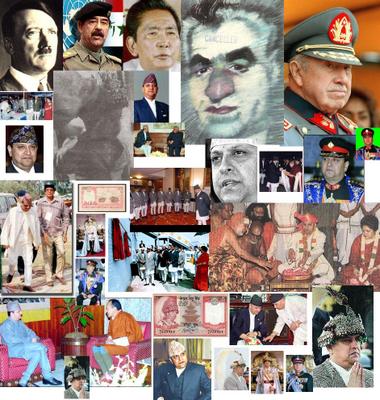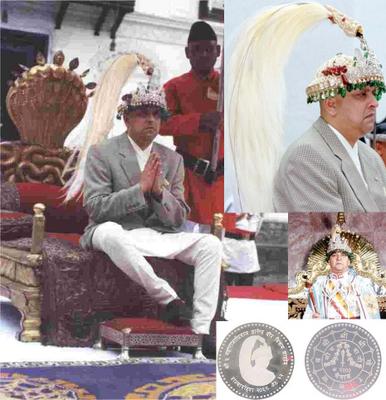 (Below are summaries in English of full length articles in Nepali.)
(Below are summaries in English of full length articles in Nepali.)Baburam Bhattarai: The Question Of Understanding A Democratic Republic
The cadres are for a Democratic Republic, but the leaders of the political parties are still not wholeheartedly for it yet. We need to look into why that might be. Monarchy and democracy are opposing ideologies and institutions. Japan and Britain can not be our examples of a ceremonial monarchy because our socio-economic development stage is not the same as theirs. No capitalist revolution has succeeded without uprooting the monarchy. Hence the words "republic" and "democracy" are actually one word. There is no example in world history where au autocrat monarch willingly became a constitutional monarch. There are no examples of constitutional monarchies in the Third World. Temporary alliances with an army or a monarchy either by democrats or external powers is understandable for different reasons, but to present the monarchy as the symbol of unity and stability is utter foolishness. The Sinhanouk example does not apply to us. BP Koirala's "national reconciliation" slogan is date expired. The Radha Krishna Mainalis inside the UML and the Prakash and Shailaja Koiralas inside the Nepali Congress are a major disservice. The parliamentary parties also have to watch out for the pressure from the US, the sole superpower, to make do with the monarchy. Global opinion will follow once the parties achieve clarity on the issue of a Democratic Republic. The monarchy is an elaborate structure that keeps the country down on all fronts. The parliamentary parties have two choices: surrender, or head on for a Democratic Republic. To try and "scare" the king into becoming a constitutional monarch is a foolish attempt. It should not even be made. A tiger that has tasted blood does not willingly go back into the cage. We should head straight on for a Democratic Republic, or we should settle for a Constituent Assembly, nothing less.
After a 10 year revolution, we Maoists have been presenting a Democratic Republic as a common minimum program. We have done it time and again. We started the revolution with the singular goal of a communist republic. For us to shift to the goal of a democratic republic has been a big step for us. The revolutionary leftists look at us with suspicion for that. At the same time, the parliamentary parties refuse to believe us when we say we are now for a democratic republic. So we feel the need to clarify a few things.
Our ultimate goal is communism, preceded by socialism. That is never going to change. But we feel the need to come down from the clouds and face the ground realities and make sound, objective, scientific assessments. That is how we prepare our programs and decide on our strategies. It has been our conclusion, based on the socio-economic conditions in Nepal, that an abolition of the monarchy and an establishment of a democratic republic is what is best for Nepal right now. That is our scientific analysis. We did not cook up the slogan to hoodwink the parliamentary parties. That is why you should believe us when we say we are for a Democratic Republic.
A democratic republic and a socialist democracy are different things. So we understand why you remain suspicious of us. The Stalinist model gets seen for the communist model, and it can be hard to imagine how a Maoist party will work within a multi-party framework. What you have to understand is Marxism-Leninism-Maoism is not religious dogma, fixed forever. It is a science. It is alive and evolving. The goal remains to create a classless society. Marx and Lenin never talked about one party rule in their writings. But it became one party rule due to Stalin. Stalin created a bureaucratic monster that detached itself from the people. And hence we had counter revolutions all over the world at the end of the previous century. And that is why, for the 21st century, we are committed to a multi-party framework where people's participation and oversight is guaranteed. That is what we want. That is our first choice, it is not a choice of an uncomfortable compromise. So believe us when we say it is a democratic republic we want.
The difference between a capitalist democracy and a socialist democracy is in the former democracy is only formal, in name only, in the later it is for real. Socialist experiments might have taken some ugly forms in the past. But periodic elections, multi party competition, adult franchise, rule of law, freedom of press and speech, these all not only exist in our version of a socialist democracy, they also are superior to when they exist in a capitalist democracy. We don't discard the good things about capitalism, we elaborate them so much, socialism spreads into capitalist territories. That is what Lenin suggested. We don't fight capitalism, we refine it, purify it, make it better.
Another suspicion has been that we Maoists will not accept the results of a Constituent Assembly should they not go in our favor. That we might follow the example in Russia. What we have to say on that is free and fair and unconditional elections conducted under international supervision will be acceptable to us. Russia of the 1910s is not Nepal of today. Let that distant past from a distant land not be your measuring rod. We have made it very clear we are for an impartial and effective management of the two armies for such elections.
A democratic republic is our ideological stand. Now try us in action. Because we are very clear on our vision and stand.
We are not headed into a traditional parliamentary arrangement or a communist arrangement. We are headed towards something new. It will be a new kind of a transitional democratic system. We are not trying to imitate Europe. But whatever it is, it will be reflective of the power distribution as thrown up by an Assembly.
It is necessary to discuss the shape and form of the proposed Democratic Republic right away, even before we go into a Constituent Assembly. That itself can be a trust-building measure. Let's have a public debate. There is nothing to hide.
On our part, this is what we see. First, the monarchy is abolished, and the sovereignty goes to the people. Two thirds of the Assembly or a referendum may decide on any matter except the country's territorial integrity. Second, the royal army is to be disbanded, and a new army is to be raised, to be under the parliament. Three, the national parliament will be supreme. Fourth, a full guarantee for periodic elections, multi party competition, adult franchise, rule of law, freedom of press and speech. Fifth, all oppressed groups - Janajatis and Madhesis - will have self rule and autonomy. Sixth, secular state. Seven, education, health and employment will be considered basic rights, and basic education and health will be free and guaranteed. Eighth, revolutionary land reform, land to the tiller. Self- reliant national industrialization, protection of national capital and properties. Ninth, dissolve the unequal 1950 treaty and other similar treaties. An independent, non-aligned foreign policy. Tenth, make room for other democratic forces in the Assembly to shape other political, economic and cultural details.
Democracy itself is alive. It grows, it changes.
Unless we - Maoists and parliamentary parties - make common cause and stand shoulder to shoulder, people are not going to come out into the streets in hundreds of thousands, and unless that happens, the king is not going to get out of the picture. We should make our conversations official and really get down to the business of talking things out in an authoritative way. Let's not waster this opportunity we have. The world looks upon us. Delays hurt the revolution.
Pramod Aryal: A Koirala Family Gone Mad On Leadership
The country is going through rough times, democracy is at stake. It has become imperative for the Nepali Congress to get clear on the issue of a Democratic Republic. Girija is extremely unclear and vacillating on the issue. The Koirala family's contributions to democracy get publicized, but their disservice to the same cause all through history is not that well known. Go look at the details. BP Koirala made major political blunders costing the country dearly just to retain the party presidency to himself. Ganeshman had written to Kisunji to oust Girija from the party during the movement, fearing his tendency to get weak with the palace. Girija sidelined Kisunji and Ganeshman, he disbanded a parliament, he forced Deuba to break away. All to keep the leadership to himself. Shashanka Koirala is a test tube baby being groomed. The Nepali Congress might get to the size of Praja Parishad. Democracy in Nepal does not depend on the Nepali Congress. Congress forgets its martyrs, its leadership instead listens to the nobodies like Govinda Raj Joshi, Arjun Narsingha KC, Laxman Ghimire, Ram Krishna Tamrakar. The party needs new leadership. Girija's poison words againt Gagan Thapa and Narahari Acharya are indicative. Nepal stands for change, Girija is not for change. Ram Chandra Poudel should run for party president. We have got to break the vicious circle of the Koirala family's hold on the party.
Ram Chandra Poudel: A Constituent Assembly Has Become Necessary
The Congress itself has to change before it can change society. There is no need for a monarchy in the 21st century. The state has to be restructuted bo provide equality for the Janajatis and the Madhesis. The Maoists need to renounce violence. A Constituent Assembly is our meeting point, that we are for with or without the Maoists. Globalization and liberalization trends have to be cashed upon. But socialism is still what we stand for. Prime Ministers have lead the army in the past. It has not always been with the king. There should be reservations for women, dalit, and janajatis. The Congress has to be unified. Internal democracy has to be introduced and institutionalized in the Congress.




